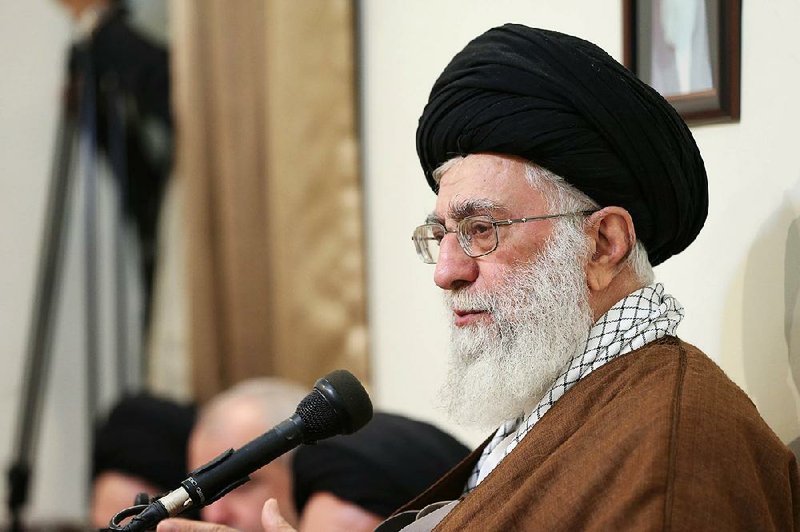TEHRAN -- Iran's supreme leader on Wednesday publicly endorsed for the first time the July nuclear agreement between Iran and six world powers, state news agencies reported. But the provisional endorsement was accompanied by a warning that Tehran expected all sanctions to be lifted or it would walk away from the deal.
The support of the supreme leader, Ayatollah Ali Khamenei, is the final step in an approval process involving the Supreme National Security Council, the Iranian parliament and the Guardian Council.
Iran can now begin carrying out the measures outlined in the agreement, including dismantling thousands of centrifuges used for enrichment and downsizing a heavy water plant so that it can no longer produce plutonium.
The endorsement was included in a letter addressed to President Hassan Rouhani that included accusations against the United States and pointed out several flaws in the deal, state television reported.
Calling for close supervision of the application of the agreement, the Joint Comprehensive Plan of Action, Khamenei said the deal "suffers from several ambiguities, and structural weaknesses ... that can lead to present and future great harms to the country in the absence of precise and constant vigilance." He added that without close oversight, the deal would lead to "great damage, to the present and future," for Iran.
The supreme leader also said Iran was seeking additional guarantees that international economic sanctions would be lifted. He demanded that President Barack Obama and the European Union guarantee in writing that "the cruel economic and financial sanctions" against Iran be completely lifted once Tehran has met its side of the bargain.
"In the statements of the EU and American president, it must be clearly mentioned that these sanctions are completely canceled," Khamenei wrote. If the sanctions stay, the deal will be void, he added.
He added that "any remarks saying the structure of sanctions will remain in place are considered a breach" of the agreement.
Khamenei also said Iran would begin fulfilling its commitments on the redesign of a heavy-water reactor and the trading of enriched uranium for raw uranium from Russia once the U.N. nuclear watchdog closes its investigation into whether Iran's nuclear program once had a military dimension.
The International Atomic Energy Agency has been trying for more than a decade to probe whether Iran carried out a half-dozen experiments linked to the development of nuclear weapons. Iran denies ever working on such arms and says its present nuclear program is meant only to generate power and for science and medicine.
The nuclear agency is scheduled to release a final assessment of the allegations Dec. 15, which help determine whether all sanctions imposed on Tehran over its nuclear program will be lifted.
While the agreement -- brokered with Iran by the U.S., the United Kingdom, France, China, Russia and Germany -- stipulates that sanctions are to be lifted, older measures are to remain in place. A central issue is that the United States will continue to regard Iran as a state sponsor of terrorism because of its support for the Lebanese Shiite militia Hezbollah.
Meanwhile, the U.S., France, the United Kingdom and Germany asked the U.N. Security Council on Wednesday to investigate and take "appropriate action" against Iran for conducting a ballistic missile test on Oct. 10.
It said the test is "a serious violation" of a Security Council resolution adopted on June 9, 2010 that bans Iran from undertaking "any activity related to ballistic missiles capable of delivering nuclear weapons, including launches using ballistic missile technology."
Information for this article was contributed by Thomas Erdbrink and Somini Sengupta of The New York Times and by Ali Akbar Dareini and Edith M. Lederer of The Associated Press.
A Section on 10/22/2015
